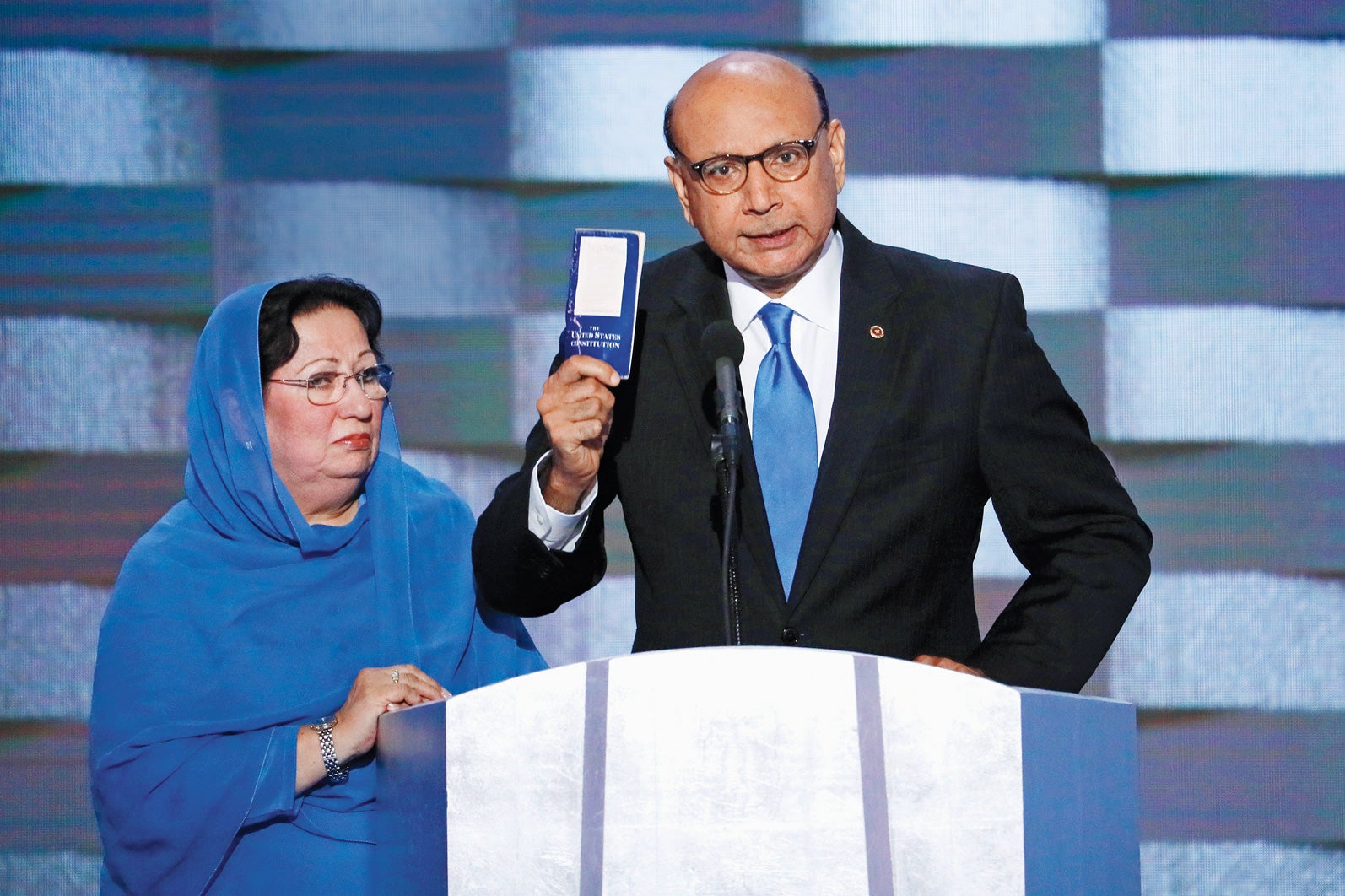On the stage of the Democratic National Convention, one Gold Star father invoked the words of the Founding Fathers, and just like that, a Pakistani-born Muslim American lawyer inspired more Americans to buy pocket U.S. Constitutions from Amazon than ever before. His life has not been the same since.
“Pre-DNC was a very peaceful, private, quiet life, and I still enjoy that every time I get back to Charlottesville, but this mission is so important,” said Khizr Khan LL.M. ’86, whose son Capt. Humayun Khan was killed in Iraq in 2004.
Khan and his wife, Ghazala, were initially asked to pay tribute to their son and appear on stage briefly to be honored on his behalf, as is customary for parents of a fallen soldier. Later, they were asked to share a few words, and Khan, responding to Donald Trump’s proposal to ban Muslims from entering the United States, wrote a lengthy piece that Ghazala whittled down to a mere 287 words.
At the DNC, the Khans stepped out from behind the curtain of private pain and into the public spotlight, attracting worldwide attention.
“Donald Trump, you are asking Americans to trust you with our future,” he said from the podium in Philadelphia. “Let me ask you: Have you even read the U.S. Constitution?”
Khan had, and he often carried his copy with him. Only a few hours before they took the stage, Khan was fumbling through his suit jacket when he felt it: his worn pocket Constitution. In the cab on the way to the DNC, he asked Ghazala, “Why don’t I say, ‘I will lend you my copy,’ and just pull it out?” He demonstrated by plucking it from his pocket. She approved, and in a few hours, the two would become emblems of the American rule of law.
Khan’s speech propelled his family into the exhausting 24-hour news cycle and attracted a flood of email and voicemail messages—some of them hateful, and many others heartwarming.
“If one scared heart is strengthened by all of this,” said Khan, “it is worth it.”
“If one scared heart is strengthened by all of this,” said Khan, “it is worth it.
He noted that his late son would be proud.
“To him, one person mattered more than his own safety, more than his own value, anything. The same thing is with me. I get encouragement from his grace.”
Khan, 66, the eldest of 10, was born and raised in Punjab, an agrarian area of Pakistan, where his parents farmed poultry. “We’re modest people, hardworking, always believed in education. I wanted to study law from childhood,” Khan said.
In 1973, he actualized his dream, getting an LL.B. from Punjab University Law College, where he met Ghazala. The Khans then moved to Dubai, where their first two sons, Shaharyar and Humayun, were born. Their son Omer would be born later in the United States, after the family immigrated in 1980.
From his HLS days, Khan fondly recalls David N. Smith ’61, then a lecturer on law and vice dean. The two spent hours discussing Smith’s book on negotiating contracts in Africa, and forged a friendship.
Smith, now a professor of law at Singapore Management University, said Khan stood out.
“I think it was because of a remarkable combination of qualities: maturity, wisdom, modesty and generosity of spirit,” Smith said. “In life we sometimes meet people who teach others a lot just by being, and Khizr is one of those people.”
Of his experience at Harvard Law School, Khan said: “It gave me the confidence in myself and showed me how little I know and that I should continue to make an effort to know more. That is what I carry with me every day.”
Khan has found a new calling in uniting people across axes of identity and amplifying the voices of Muslims who have been “misdefined,” encouraging them to participate in politics.
“I’m an ordinary Muslim. … I am a protector of the United States. … My son … sacrificed his life in protection of the United States and its soldiers,” Khan continued. “Islam has taught me to be caring, to be kind. My religion is to live peacefully with all other religions and all other peoples.”
In Arlington National Cemetery, the Khans often visit Capt. Humayun Khan’s gravestone, carved with the crescent and star of Islam and encircled by tributes, a wreath of bright red, white, and blue blossoms and a star-spangled flag.
